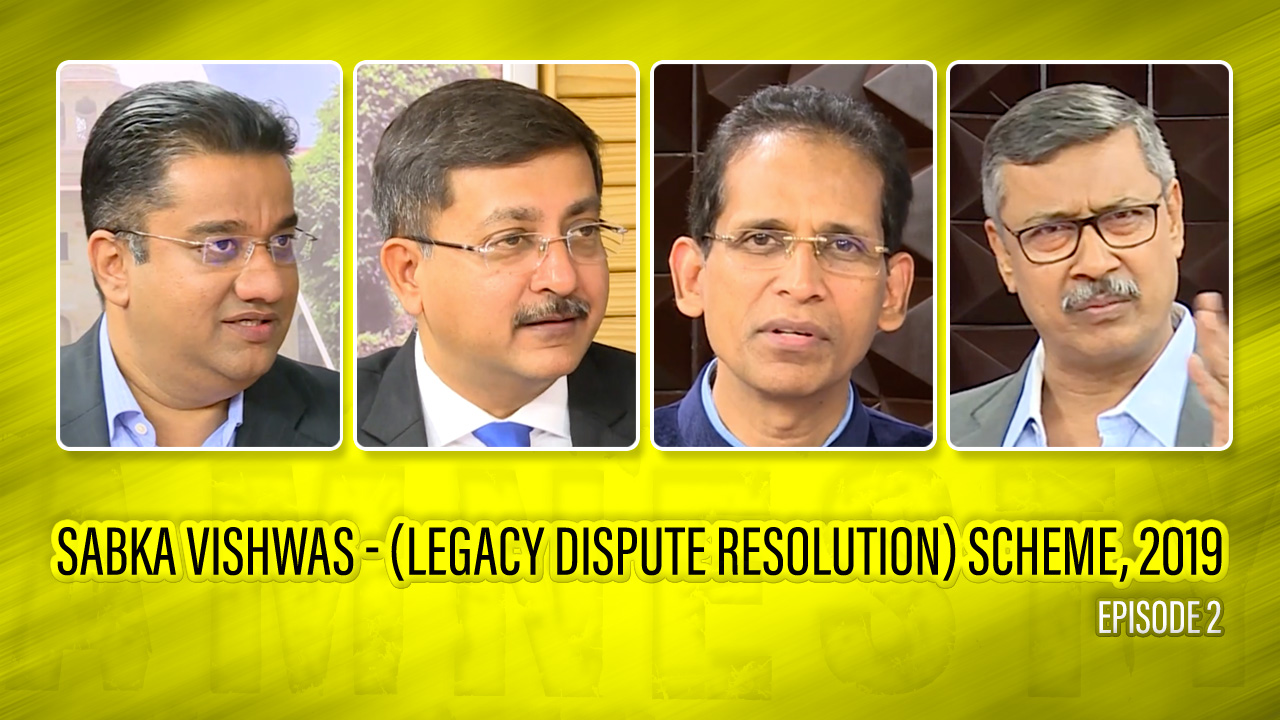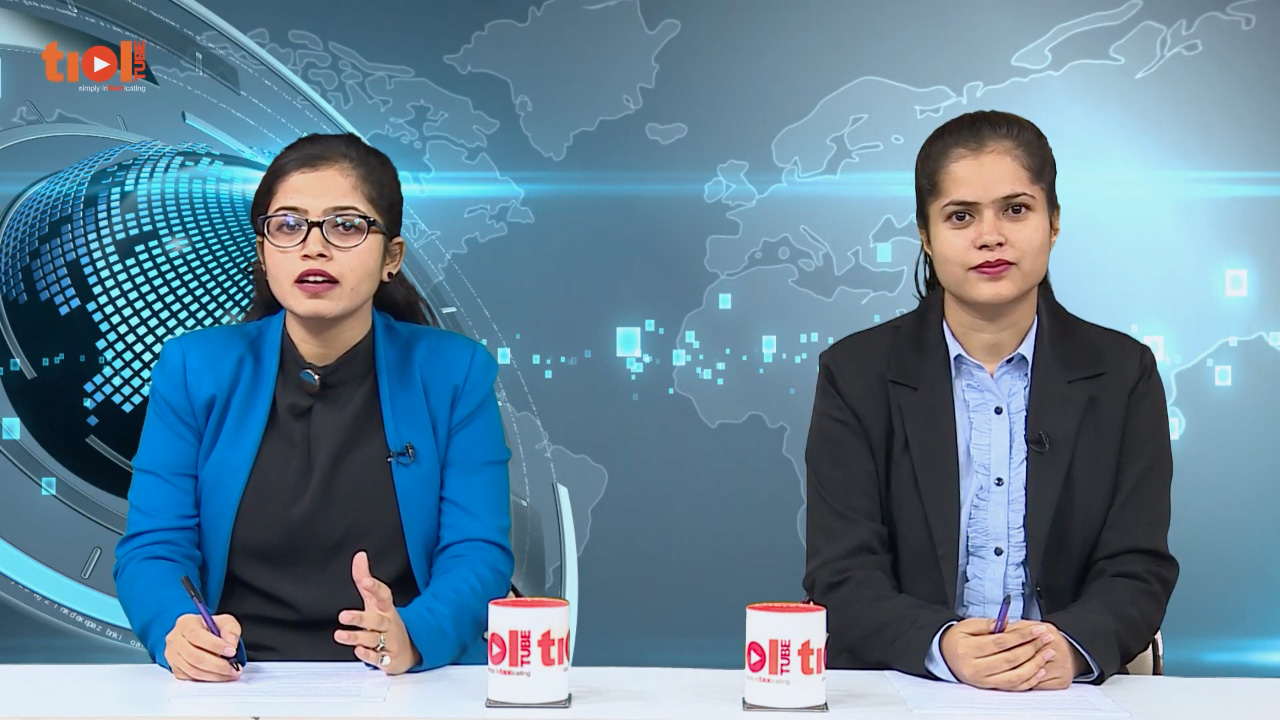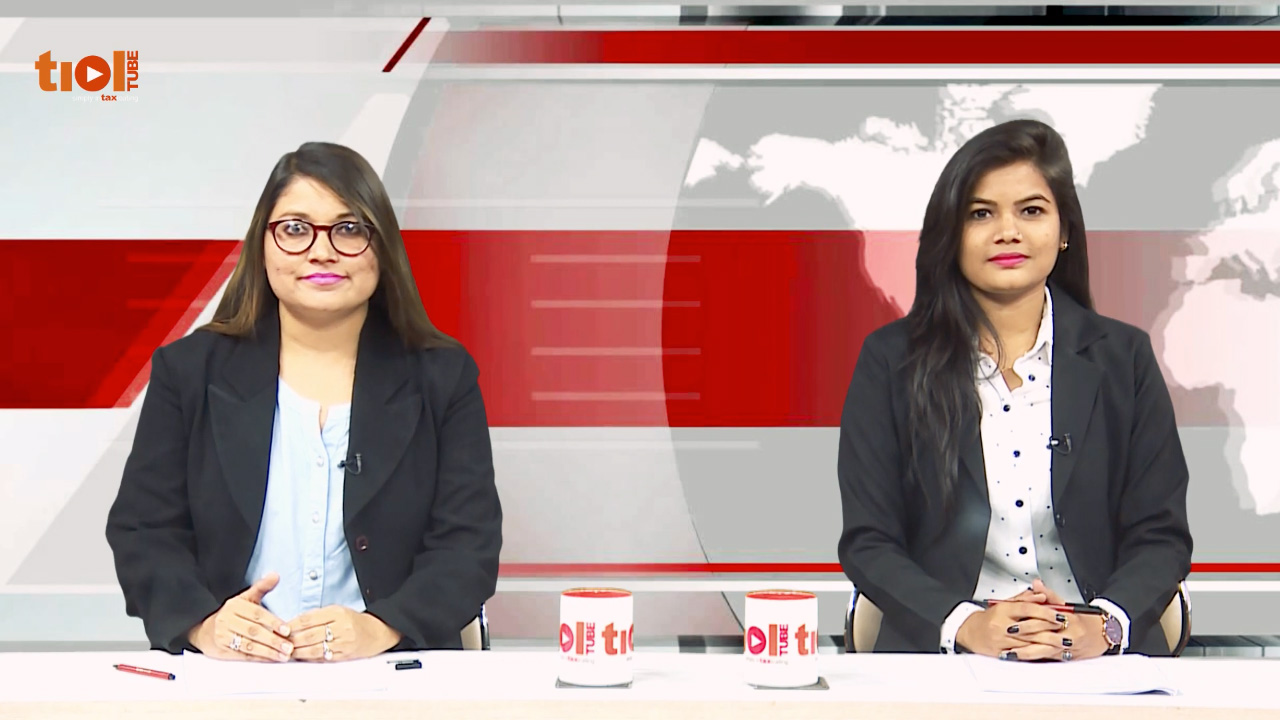| SERVICE TAX
ST - COD - It has been stated that since the delay was not under the control of assessee, it should be condoned by taking a liberal view - The averments made in the delay condonation application do not convince that the assessee was prevented by sufficient cause from preferring the appeal within the stipulated period - There is no statement as to when and how the assessee came to know about the impugned order - The averments are vague because all that has been stated is that the order escaped the attention of proprietor, though it was received on 10 July, 2018 and it is only when the order came to the notice of management, then immediate action was taken - The delay condonation application is, accordingly, rejected: CESTAT
- Appeal dismissed: DELHI CESTAT
ST - Show cause notice dated 16.01.2015 was issued for the period October, 2011 to March, 2013 invoking extended period of limitation demanding interest under Section 75 of the Finance Act, 1994 for delay in deposit of service tax - Period of limitation prescribed for claim of principal amount should also apply to the claim for interest thereon - show cause notice is bad, both for invocation of extended period of limitation and also for non-invocation or non-mentioning of proper Section 73(1) with proviso - show cause notice is held to be non-maintainable - Impugned order is set aside and the appeal is allowed: CESTAT [para 9]
- Appeal allowed: DELHI CESTAT
ST - Department visited the premises of the appellant which is engaged in business of sale of cars/automobiles having a dealership of Maruti Udyog Ltd. - It was noticed by the Department that the appellant was acting as a marketing agent for several banks and financial institutions who are engaged in the business of car finance - These car dealers/ firms/agents (including the appellant) were acting as direct selling agents/direct marketing agents for various banks and financial institutions such as ICICI Bank, HDFC Bank, Citi Bank and other Non Banking Finance Companies such as M/s. Maruti Finance, M/s. Maruti Countrywide and M/s. City Mobile Finance Ltd. etc. - Department was of the view that the activity as mentioned above, undertaken by the appellant falls under the category of Business Auxiliary Service as provided under Section 65 (19) of the Finance Act, 1994 and therefore, the appellant was required to pay the service tax with effect from 01 July, 2003 - demand confirmed and upheld by Commissioner(A) but quantum of demand reduced which was attributable to duplication of demand - assessee appeal before CESTAT.
Held: Larger Bench decision in the case of M/s. Pagariya Auto Center - 2014-TIOL-141-CESTAT-DEL-LB supports the case of classification of the activity undertaken by the appellant under the category of 'Business Auxiliary Service' - therefore, the findings given in impugned order in appeal do not call for any interference - Demand upheld: CESTAT [para 14, 15]
Penalty - So far as the imposition of penalty under section 78 of Finance Act, 1994 is concerned, firstly the appellant had deposited the entire amount of Service Tax demanded under the Show cause notice dated 30 November, 2006 along with interest much before the issue of show cause notice - Secondly, there was a certain amount of confusion at the field level for proper classification of activity undertaken by the appellant as to whether it is classifiable under the category of 'Business Auxiliary Service' or under 'Business Support Service' and since there have been multiplicity of interpretation with regard to the applicability of service tax law in the nature of activity undertaken by the appellant, penalty shall not be imposed under section 78 of the Finance Act if there is no deliberate violation of the statutory provisions of law - In the present case, there is no presence of any of the elements like fraud, collusion, willful mis-statement, suppression of facts or contravention of any of the provisions with intent to evade payment of Service Tax, therefore, the imposition of penalty under section 78 in this case is not justified: CESTAT [para 16, 18]
- Appeal partly allowed: DELHI CESTAT
ST - Residential complex construction service - Revenue entertained a view that after the completion certificate, no service was being provided by the appellant attracting any payment of service tax, therefore, they are required to reverse the proportionate credit involved in the subsequent sale purchase of the flats - demand confirmed, hence appeal to CESTAT.
Held: Identical issue was considered by the Tribunal in the case of Alembic Ltd. & Shreno Ltd. - 2019-TIOL-358-CESTAT-AHM upheld by the High Court of Gujarat reported as - 2019-TIOL-1495-HC-AHM-ST and wherein it is held that the time of taking credit, there is no existence of any exempted service, therefore, there is no application of Rule 6 - moreover, an explanation was added in rule 6 of CCR by notification 13/2016-CE(NT) explaining that the exempted services would also include an activity, which is not a service as defined in Section 65B (44) of the Finance Act, 1994 - High Court has also observed that such explanation would be effective prospectively from the date when the same was introduced - since the period involved in the present is appeal prior to introduction of the said explanation, it has to be held that there was no obligation on the part of the assessee to reverse any credit subsequent to the issuance of the completion certificate - impugned order is set aside and the appeal is allowed with consequential relief: CESTAT [para 2 to 4]
- Appeal allowed: MUMBAI CESTAT
ST - The assessee had provided taxable service in category of "sale of space or time for advertisement" to M/s Gujarat Ambuja Ltd. - In this regard, two agreements were entered into by the assessee with M/s Gujarat Ambuja Ltd. - The Revenue felt that since the assessee realised a part of the amount of service in advance before the date on which service tax was levied on the said service, the assessee was leviable to pay service tax on that value of service tax, which was attributable to the service rendered in the period after service tax was levied on the said service - The assessee is not challenging the taxability and demand, they are only contesting the interest and penalty - As the payment of service tax was required to be done on a lump sum basis, the amount of interest demanded for the delayed payment of service tax is in accordance with Section 75 of the Act - Even if the investigating officer had earlier informed about the interest on monthly basis, the same cannot override the statutory requirement for paying the interest on the demanded amount as required by the statute - Hence, the demand of interest is upheld - As regards to penalty under Section 78, assessee was in regular correspondence with department from the beginning after onset of levy and had been following the advice given to them by the investigating officer to pay monthly instalments of service tax along with interest - Besides, the service tax on impugned service, had been newly introduced at that time and assessee had acted very much in line with the advice given by investigating officer - In these circumstances, suppression cannot be alleged - In the unique circumstances of the case where assessee was acting in line with instructions of Department from the beginning and there was change in stand of Department, benefit of Section 80 would be admissible to the assessee - Since, the benefit of Section 80 of the Finance Act is allowed to the assessee, the Revenue's appeal against order of Commissioner's (A) dropping the penalty under Section 76 is liable to be dismissed: CESTAT
- Appeal partly allowed: CHANDIGARH CESTAT
ST - The assessee constructed a mall, which was subsequently rented out by them to various lessees - The revenue's objection is to availment of Cenvat credit of duty paid on various inputs, capital goods and input services consumed for the construction of the mall on the ground that the construction activity has not discharged any service tax liability and as such the credit cannot be held to be available to the assessee - Said issue stands covered by various decisions of Tribunal wherein the Judgment of Andhra Pradesh High Court in case of Sai Sahmita Storages Pvt. Ltd. - 2011-TIOL-863-HC-AP-CX stands followed - Reference to the Tribunal's order can be made in Oberoi Mall Ltd. - 2016-TIOL-704-CESTAT-MUM & M/s Laxmi Enterprises - 2014-TIOL-2042-CESTAT-AHM wherein it stands held that services used for constructing mall which were meant for renting which were discharging service tax liability, the duty paid on the inputs or capital goods or services used for construction of the mall is available as credit - As such, the credit stand rightly availed by assessee and utilized for discharge of their service tax liability under category of 'Renting of Immovable Property' - Inasmuch as, the appeal has been allowed on merits, Tribunal is not going to alternative plea of demand being barred by limitation: CESTAT
- Appeal allowed: ALLAHABAD CESTAT
CENTRAL EXCISE
CX - There is no dispute regarding value of clearances effected by assessee and the only dispute is regarding bifurcation of these clearances into knitted garments and non-knitted garments - The Department in SCN quantified assessable value of dutiable goods i.e. non knitted garments at 1,92,83,241/- involving Central Excise duty amounting to Rs. 25,86,133/- whereas assessee contended total clearance of dutiable goods was below the SSI limit - The Commissioner (A) quashed the demand holding that the Adjudicating Authority has affirmed the demand on the basis of assumptions without appreciating that there was nothing on record to suggest that any investigation was caused from the buyer of the goods as to whether the garments cleared by assessee manufacturer were knitted or non knitted and further observed that Adjudicating Authority rejected the assessee's contentions that the goods which have been claimed as knitted were in fact non Knitted garments, on the inference that the assessee could have made 13976 garments in year 2001-02 and 15622 garments in the year 2002-03 on the basis of purchase of woven fabric after giving a margin for wastage and held that the assessee had shown exorbitant high consumption of cloth per piece and observing that neither in SCN nor in O-I-O any documentary evidence or authenticated technical literature was referred for arriving at such a conclusion and relying on the judgment of Supreme Court in M/s Oudh Sugar Mills wherein it is held that demand confirmed on assessee cannot be fastened on the basis of aforesaid assumptions - The Commissioner's findings on this aspect cannot be faulted - There is no dispute that the gatekeepers/security staff were contractual persons employed by security contractor - The register maintained by them was not under the instructions of the assessee and the said register was not supervised and/or scrutinized by assessee - Thus, nothing found wrong in Commissioner's observation that confirmation of demand relying on those registers was incorrect - The Revenue's contention on this count also is unimpressive and merits rejection - The Revenue in the last ground has made a bald assertion that the case laws relied upon by Commissioner (A) do not apply in these cases without citing specific instances - Revenue's contention is devoid of merit, as from the SCN and O-I-O, it is evident that before relying on the entries in the said register Department did not cause any inquiry from the buyer/recipient of the goods or transporters though all the details were available to them - At the cost of prolixity, there is no allegation that the assessee cleared any material without raising invoices but only charge is that the goods cleared as knitted garments or fabric were in fact non-knitted garments and that assessee wrongly claimed some entries to be those related to return of goods or clearance of samples - Without any investigation from buyers of goods or transporters to conclusively ascertain that goods were knitted or non-knitted and to verify the veracity of assessee's claim in respect of return of goods/clearance of sample confirmation of demand on the basis of outward register that too not maintained by assessee's office but by the Security personnel engaged by security contractors cannot be sustained - Accordingly, no infirmity found in the impugned order, same is upheld: CESTAT
- Appeals dismissed: DELHI CESTAT
CX - Appellant did not avail CENVAT Credit of the duty amount indicated in the invoices immediately and had availed such credit after a lapse of 1½ years from the date of receipt of duty paid goods in the factory - Viewing that taking of belated credit was in contravention of Rule 4(1) of CCR r/w Rule 16 of CER, 2002, inasmuch as the credit was required to be taken immediately on receipt of the duty paid goods in the factory, SCN was issued and the credit was denied by lower authorities - appeal before CESTAT.
Held: In this case, the fact is not in dispute that the duty paid goods initially removed from the factory were received back for the purpose of carrying out some process and after completion of such process/activities; the same were removed from the factory on payment of Central Excise duty - Thus, under the provisions of Rule 16 of the Rules, the appellant was entitled to take CENVAT Credit of Central Excise duty paid on excisable goods, which were subsequently returned back to the factory - The only objection raised by the department is that the credit has not been availed immediately on receipt of the duty paid goods, accompanied with the invoices - So far as Rule 4 ibid is concerned, the requirement is that "credit on the inputs may be taken immediately" - Since the legislature has used the word 'may' for interpretation of the statute, it cannot be construed differently to mean that the said phrase has to be strictly interpreted - authorities conferred with the power to interpret the statutory provisions, should harmoniously read the contents of the statute for the purpose of proper appreciation regarding the reason of availment of belated credit and on satisfaction, liberal view should be taken in extending such benefit - Interpreting the provisions of Rule 4 ibid, the CBEC in the Excise Manual of Supplementary Instructions, 2005 has clarified that if the manufacturer does not take credit as soon as the goods are received in the factory, he would not be denied the benefit of such credit - On examination of the provisions between the Order XXI of Rule 84 (1) of the Criminal Procedure Code vis-à-vis Cenvat statute, it transpires that the later provisions were designed in such manner that the authorities should take liberal view in extending the benefit of credit, appreciating the overall facts and circumstances of the case and the statutory provisions cannot be strictly applied for denying the benefit of legitimate claim of the Cenvat amount - due to reasonable cause, the appellant did not avail the credit immediately on receipt of the goods, for which the substantive right conferred in the Cenvat statute cannot be denied - impugned order set aside and appeal allowed: CESTAT [para 6, 7]
- Appeal allowed: MUMBAI CESTAT
CX - Appellant deposited an amount of Rs.51,41,758/- in pursuance to EA-2000 Audit objection relating to admissibility of CENVAT Credit availed on capital goods - Two proceedings have been initiated, one by filing refund of the duty by the appellant and another by way of show-cause notice issued by the Revenue seeking recovery of duty and appropriation of the credit alleged to have been wrongly availed - The proceedings initiated for recovery/ appropriation of the credit ultimately dropped by the Commissioner vide order dated 15.01.2014 - In the meantime, the proceedings relating to refund claim by the appellant was decided by the Commissioner (Appeals) rejecting their claim - Since the adjudicating Commissioner dropped the demand notice, therefore, the order rejecting refund claim needs to be re-examined - impugned order set aside and matter remanded: CESTAT [para 5, 6]
- Matter remanded: MUMBAI CESTAT
CX - The assessee-company manufactures transformer radiators falling under Chapter Heading 8504 9010 of Schedule I to the CETA 1985 - The Audit wing noted that the assessee did job work of galvanization using input Zinc procured, on which Cenvat credit was availed - The assessee used such Zinc for galvanization of both dutiable finished goods and exempted job work activity - It was observed that the assessee was not maintaining separate accounts - Therefore, the assessee was held liable to reverse u/r 6 of CCR 2004, such credit availed on the inputs, without collecting the reversed credit from job work suppliers - However, the assessee raised invoices for job work charges as well as Excise Duty Debited, representing the amount of proportionate Cenvat credit on input Zinc used in galvanization and wrongly collected the same from its customers and retained such amount - The Revenue opined that the assessee unjustly benefited and enriched itself twice by taking credit at time of receipt of input zinc and also by collecting credit on the same from its customers - Duty demand was raised along with interest - Penalty was imposed u/r 27 of the CER 2002 - Such demands were confirmed upon adjudication and were sustained by the Commr.(A) - Hence the present appeal.
Held - The Commr.(A) relied on the decision of the Larger Bench of the CESTAT in Sterlite Industries (I) Ltd. vs. CCE, Pune which was later sustained by the High Court of Bombay, which held that the assessee can avail credit on inputs procured and used in job work when the duty is paid on the final product by the principal manufacturer - Admittedly, the assessee has debited or reversed the duty at the end of the month, which was collected from the principal manufacturers - In view of the reversal of duty collected from the principal manufacturers, there is no amount which is collected from the customers and retained by the assessee which would attract the provisions of Section 11D - Provisions of Section 11D(1A) of the CEA 1944 is unwarranted where the assessee collected only the amount of credit admittedly debited and such amount is not retained by the assessee - Hence the demand raised by invoking Section 11D is unsustainable - Moreover, the Revenue brought forth no evidence showing suppression of facts on the assessee's part with intent to evade payment of duty - The assessee reflected invoice-wise details of Cenvat credit in ER-1 returns and copies of the invoices are on record - Hence the SCN raising duty demand is barred by limitation - Hence the orders in challenge are not sustainable on merits or on limitation: CESTAT
- Assessee's appeal allowed: BANGALORE CESTAT
CX - The assessee-company manufactures Maize Starch and Dextrine falling under CETH 1108, 11200 and 3505 1090 of the first schedule to the CETA 1985 - During the relevant period, an SCN was issued to the assessee proposing to disallow credit on capital goods on grounds that as per Rule 6(4) of the CCR 2004, no credit could be allowed on capital goods used exclusively for manufacturing exempted products - It was alleged that the assessee manufactured both dutiable and exempted products - While Starch is dutiable, Gluten, maize fibre and Germ were exempted products - During manufacture, Starch got separated from the Maize at some stage beyond which the other exempted products were also processed, packed and sold - The Revenue found that the assessee wrongly availed credit on these capital goods used exclusively for manufacturing exempted products beyond the stage at which they are separated from the dutiable product - Duty demand was raised to recover credit u/r 14 of the CCR 2004 r/w proviso to Section 11A(1) of the CEA 1944, along with interest u/s 11AB - Penalty u/s 11AC was also imposed - Such demands were confirmed by the adjudicating authority as well as by the appellate authority - Hence the present appeal.
Held - The case of Rana Sugar Ltd. vs. CCE, Ludhiana relied upon by the assessee is on a different footing where the sugar factory was manufacturing denatured alcohol which is dutiable and the intermediate product in the process of manufacturing ethyl alcohol, which was exempted - The Tribunal held that cenvat credit on the inputs and capital goods used in the manufacture exempted intermediate product cannot be denied when the final product is dutiable - In the present case, the starch is the dutiable final product and gluten maize germ are final products which are exempted - What is sought to be denied is the credit of capital goods on such machinery which is used for processing the exempted products after they are separated from the raw material - The assessee's counsel sought to canvass that the entire process is integrated & cenvat credit cannot be denied on the capital goods - Even if the process is integrated, if separate machinery is used for processing the exempted products after separation from the main product or raw material and such machinery is used only for processing exempted products, Cenvat credit cannot be availed by the assessee, as per the provisions of Rule 6(4) of the CCR - Hence the order in question do not warrant any interference with: CESTAT
- Assessee's appeal dismissed: HYDERABAD CESTAT
CUSTOMS
2019-TIOL-2494-HC-MUM-CUS
Miltons Ltd Vs UoI
Cus - Petitioner No.1 had an unblemished past track record and that the petitioner No.1 was not directly involved in the import - Discretion to impose a penalty must be exercised judicially - A penalty will, ordinarily, be imposed in cases where the party acts deliberately in defiance of law or is guilty of contumacious or dishonest conduct or acts in conscious disregard of its obligation but not, in the cases where there is a technical or venial breach of the provisions of the Act or where the breach flows from a bonafide belief that the offender is not liable to act in the manner prescribed by the statute - facts clearly reveal that the letter of authority holder had made request for re-validation and for issue of subsidiary licences - Petitioner No.1 claims that it had not issued any letter of authority in favour of M/s. A.P. Trading Company and there is no evidence available on record to show this - Petitioner No.1 had given the licence to M/s. Veena Commercial Corporation, therefore, unless it is shown or established that the import of the canalized item is at the instance of the petitioner No.1 or they are involved in some manner with the import or that the petitioner No.1 is in some way concerned with M/s. A.P. Trading Company in the matter of import of the canalized goods, imposing penalty on the petitioners in the absence of mens rea is unsustainable - As the licence is misused by the letter of authority holder M/s. A.P. Trading Company, in the absence of mens rea which is an essential ingredient of the offence, the petitioner No.1 cannot be held liable to pay the penalty - Petition is allowed in terms of prayer clause (a) and (b): High Court [para 20 to 22]
- Petition allowed: BOMBAY HIGH COURT
| 







